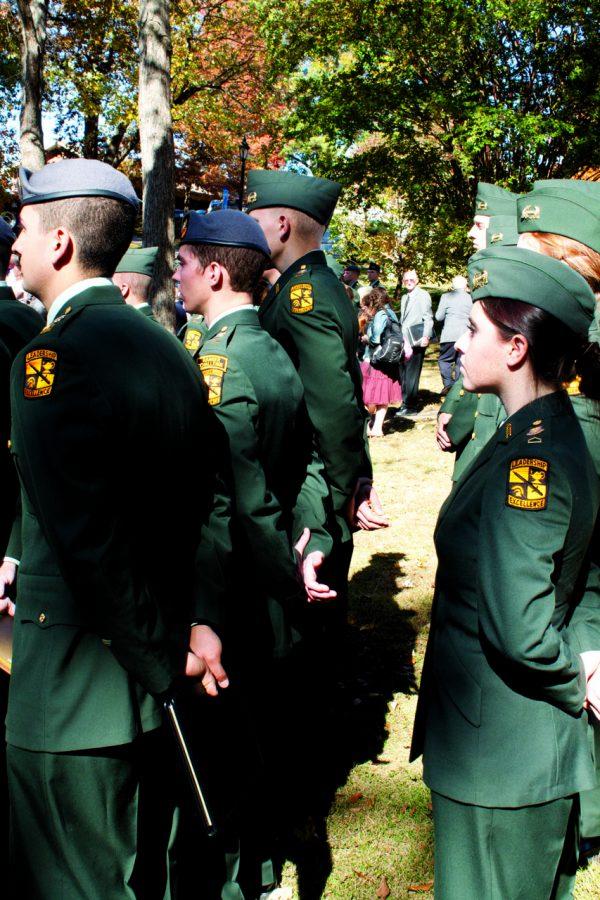War hero inspires cadets at ROTC celebration
November 18, 2010
<p style=
“margin: 0.0px 0.0px 0.0px 0.0px; text-align: justify; text-indent: 14.4px; line-height: 11.3px; font: 10.5px Times;”>
When UNA alumnus Robert Jackson was commissioned as an officer at
the Memorial Amphitheatre in 1963, he didn’t anticipate the lessons
he would learn through his three combat tours in Vietnam and
Dominican Republic or what impact he would ultimately have on the
U.S. military.
<p style=
“margin: 0.0px 0.0px 0.0px 0.0px; text-align: justify; text-indent: 14.4px; line-height: 11.3px; font: 10.5px Times;”>
Jackson, who spoke at the ROTC Veterans Day Program Nov. 11, which
honored 1,105 commissioned cadets at UNA since 1950, encouraged
veterans to share their stories of war in order to help others and
themselves.
<p style=
“margin: 0.0px 0.0px 0.0px 0.0px; text-align: justify; text-indent: 14.4px; line-height: 11.3px; font: 10.5px Times;”>
“After 25 years of combat, I didn’t talk about my experiences
except with close friends and family,” Jackson said. “But you owe
it to yourself and other people to share your stories. It was very
therapeutic for me and changed me internally.”
<p style=
“margin: 0.0px 0.0px 0.0px 0.0px; text-align: justify; text-indent: 14.4px; line-height: 11.3px; font: 10.5px Times;”>
Jackson was featured in Walter Cronkite’s Emmy-award winning 1970
CBS documentary “The World of Charlie Company” and later in the
1978 follow-up documentary “Charlie Company at Home.” The first
film, which shed light on how fighting in the jungles of Southeast
Asia impacted Jackson and other soldiers, was shown in the GUC
Performance Center shortly after the ROTC program and luncheon.
<p style=
“margin: 0.0px 0.0px 0.0px 0.0px; text-align: justify; text-indent: 14.4px; line-height: 11.3px; font: 10.5px Times;”>
The celebration, which took place at the Memorial Amphitheatre,
brought hundreds of UNA graduates, war veterans, commissioning
cadets, and family and friends of soldiers to the program.
Reflecting on his own leadership experience in the military,
Jackson reached out to young cadets about what it takes to be a
successful leader.
<p style=
“margin: 0.0px 0.0px 0.0px 0.0px; text-align: justify; text-indent: 14.4px; line-height: 11.3px; font: 10.5px Times;”>
“You have to know your job, know your code and know your people,”
he said. “You need to be an expert in your field and be the go-to
person who does things best and who people come to. You need to
know your code, which is another way of saying you need to know
yourself. You have to know your people and their strengths and
weaknesses. You have to give yourself up, do the hard work and make
the difficult decisions.”
<p style=
“margin: 0.0px 0.0px 0.0px 0.0px; text-align: justify; text-indent: 14.4px; line-height: 11.3px; font: 10.5px Times;”>
President William Cale also spoke at the ROTC program, outlining
UNA’s military history. He said 288 soldiers who studied at UNA
served in World War I, leaving six dead. After the Memorial
Amphitheatre was built in 1936, 15 of 318 UNA soldiers died in
World War II. When soldiers returned to college on the G.I. Bill,
17 officers were commissioned for the first time on UNA’s campus in
1950.
<p style=
“margin: 0.0px 0.0px 0.0px 0.0px; text-align: justify; text-indent: 14.4px; line-height: 11.3px; font: 10.5px Times;”>
Cale quoted the famous words by American politician Zell Miller at
the program last Thursday.
<p style=
“margin: 0.0px 0.0px 0.0px 0.0px; text-align: justify; text-indent: 14.4px; line-height: 11.3px; font: 10.5px Times;”>
“It is the soldier, not the reporter, who has given us the freedom
of the press. It is the soldier, not the poet, who has given us
freedom of speech. It is the soldier, not the agitator, who has
given us the freedom to protest. It is the soldier who salutes the
flag, serves beneath the flag, whose coffin is draped by the flag,
who gives that protester the freedom to abuse and burn that flag,”
he said.
<p style=
“margin: 0.0px 0.0px 0.0px 0.0px; text-align: justify; text-indent: 14.4px; line-height: 11.3px; font: 10.5px Times;”>
For Jackson, the Veterans Day celebration at UNA signified a shift
in attitudes toward military service across the nation.
<p style=
“margin: 0.0px 0.0px 0.0px 0.0px; text-align: justify; text-indent: 14.4px; line-height: 11.3px; font: 10.5px Times;”>
“I’ve grown to appreciate Veterans Day more,” Jackson said in a
private interview before the ROTC program. “When I came back from
Vietnam to Los Angeles, there was a low appreciation for the
military, but I’ve begun to see more and more of an appreciation
over the years, as I’ve seen my son and what he sacrificed in
combat, the close friends we lost in the war and the people who
risk their lives to serve and do their part.”


